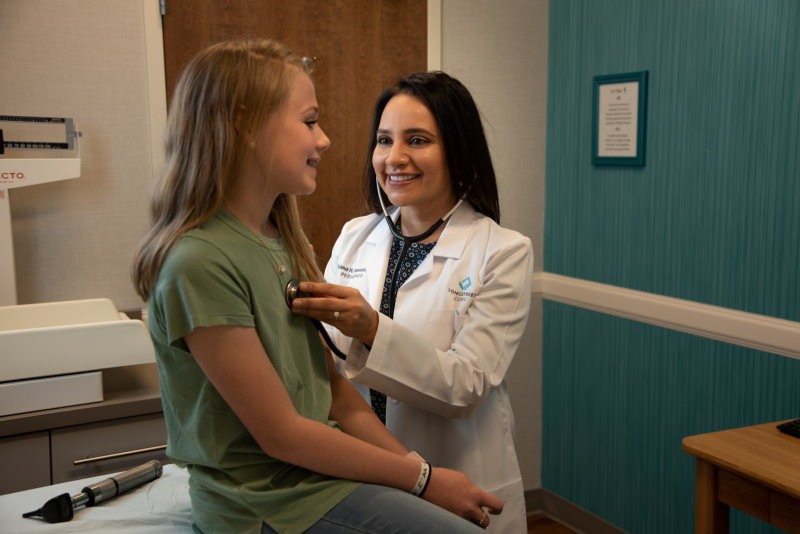A pediatrician at The Longstreet Clinic is urging parents to take control of their child’s immunizations, get the facts and make sure their child is up to date this summer.
"There's a lot of people out there that are spreading lies, they're spreading fear, and the most important thing you can do is call your doctor, come in for a visit to your doctor and tell them your fears, tell them what it is that you've read, give them an opportunity to give you actual facts, to give you data, to go through studies with you and that is the best way we can combat all of these myths and misinformation out there,” said Dr. Saima Hussain.
“I think once people have face to face communication and they can actually get their question answered, get the things that they're worried about and those fears away with their doctor, that will go really far in sort of turning the tide in getting people back in believing in science and believing in vaccinations.”
Many parents turn to their smartphones and laptops for medical advice instead of reaching out to medical professionals or other parents and Hussain said finding the wrong information during your online search can create a scary narrative. Hussain said misinformation most famously includes the thought that certain vaccines cause other problems, like autism, or that the chemicals in them are dangerous.
"However the danger is, not only is all of that information completely false, vaccines are completely safe, vaccines don't cause diseases, they don't cause autism; but the more that people don't vaccinate, the more that the diseases the vaccinations prevent against, they're resurging. Measles is an example. The MMR vaccine has been falsely accused to cause autism and since that myth has been out there, lots of people refusing to get that vaccine and now we're seeing a resurgence in measles all over the U.S."
National health officials told the Associated Press they had reported 971 cases of measles this year. Hussain said that increase is especially risky for those that are unvaccinated and it’s not just measles.
"We are seeing a lot more cases in mumps than we used to. And again, that's the same vaccine - the MMR vaccine - and globally there's been researches of certain diseases, like polio, we've seen outbreaks of certain cases of polio in certain countries. If we think about measles, a lot of the people who have been diagnosed with measles have traveled from other countries. I think there were a couple of cases there where people were traveling to Israel and came back because there were cases of measles in Israel, they came back and infected the community here. We haven't seen any cases of polio here, but we're a very global community here and that's what worries me. That when we see resurgence of diseases in other countries, if that comes over here and because people are not vaccinated, we're going to start seeing resurgence of those diseases as well."
At the Longstreet Clinic, Hussain said they urge their patients to communicate with their doctors and stay on schedule. She said they vaccinate patients during their well check-ups as usual, but they also push during the summertime reminders to get kids – especially middle schoolers, who get a new round of immunizations – vaccinated, Maintaining the vaccination schedule also helps herd immunity, and Hussain said Georgia’s herd immunity in the 90th percentile, but Hussain said overall, it is decreasing. She said herd immunity has to be pretty high for it to work and protect others, like those with compromised immune systems.
"The dangers of some of these diseases, like the measles, is that they're very contagious. So someone who has the measles, if they walk into a room, eight to 10 hours later, droplets that carry that virus are within that room. So if an unvaccinated child gets that exposure, the risk for that unvaccinated child is extremely high. So kids that have a weakened immune system because they have cancer, or are getting chemotherapy, they are an extremely high risk for exposure if they get close to anyone that has that disease." She added that those who have already completed a full round of immunizations have a “very low” chance of catching an illness if exposed, about 95%.
Parents who are unsure of what immunizations their child needs to be “legal” in the school system can check out resources and all the required forms on the Georgia Department of Public Health website. Legally, students entering a school or childcare facility must be immunized against 13 illnesses: diphtheria, Haemophilus influenza type B (Hib disease), hepatitis A, hepatitis B, measles, meningitis, mumps, pertussis (whooping cough), pneumococcal, poliomyelitis (polio), Rubella (German measles), tetanus and varicella (chicken pox). Seventh graders must also receive one dose of Tdap and one dose of meningococcal conjugate vaccines.
The only time a student is allowed to skip immunizations completely is if they have a medical issue or if their family has a religious exemption. The religious exemption requires families complete an affidavit form. Hussain stressed that any school-aged child that is well, healthy and can be vaccinated, should.
Families determining what’s best for their child is a complex decision, but Hussain said parents worried about the financial element of immunizations need to know they have options.
"All insurances cover vaccines as part of maintenance visits. In the state of Georgia, we have a VFC program that covers those that aren't able to afford vaccines. Anyone that's on Medicaid can get vaccines and that should be covered. And if someone is not insured... most health departments offer these vaccines at a reduced rate, so they can go to the health department and get the vaccines there as well."









